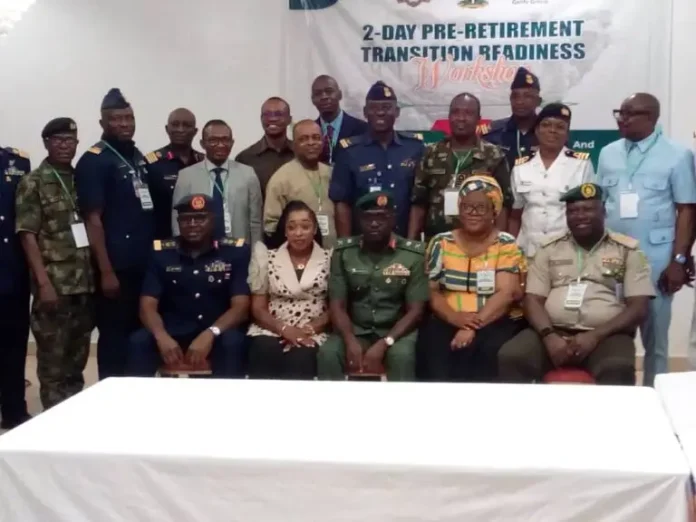News Investigators/ The Defence Headquarters (DHQ) has reaffirmed its commitment to the welfare of personnel exiting the Armed Forces, saying it is prioritising life after service through structured transition and rehabilitation programmes.
The Director, Support Services, DHQ, Maj.-Gen. Olatokumbo Bello, made this known at the closing of a Two-Day Pre-Retirement Transition Readiness Workshop for senior officers on Tuesday in Abuja.
Bello said the programme was designed to equip soon-to-be-retired officers with practical skills, psychological readiness, and legal awareness for life after active duty.
“The essence of this programme, as the name implies, is to assist officers who will soon retire from the Nigerian Armed Forces.
“The Defence Headquarters prioritises life after service, especially for those who have put in 20 to 30 years.
“It is important to prepare them with skills, advice, and psychological readiness that will follow them into retirement,” he said.
Bello added that the workshop was structured to be interactive to enable officers share experiences and provide feedback that would help DHQ strengthen future transition initiatives.
“The products of this workshop will be packaged and used to further assist DHQ in preparing officers for the future,” he added.
Delivering a lecture on “Legal Affairs, Will Writing and Retirement Rights”, Justice Godwin Iheabunike of the Federal Capital Territory High Court, urged personnel to take legal preparedness seriously.
He noted that retirement planning goes beyond finance to include family, legal, and emotional stability.
He described legal preparedness as the process of ensuring that one’s affairs, which include wills, powers of attorney, and pension documentation, were in proper legal order before or upon retirement.
Justice Iheabunike identified four key goals of legal preparedness: preservation of wealth, avoidance of litigation, securing dignity in retirement, and promoting intergenerational equity.
He also encouraged officers to prepare living wills, which he said outline how assets and responsibilities should be managed in cases of incapacitation, thereby ensuring peace of mind and family harmony.
On pension rights, the judge reminded participants of their entitlements under the Pension Reform Act, 2014, urging them to know their Retirement Savings Account (RSA) status, withdrawal rules, and the importance of regularly reviewing contributions.
“A modest investment of time and professional advice today can avert costly and acrimonious disputes tomorrow,” he said.
The Project Coordinator, Transition Assistance Programme, Ms Ijeoma Akwara, said the initiative aims to equip retiring officers with practical skills, legal knowledge, and psychological readiness.
Akwara said the workshop was benchmarking aspects of the United Kingdom’s model to ensure transparency and sustainability.
“The essence of this programme, as the name implies, is to help officers who are soon to retire from the Armed Forces of Nigeria prepare for life after service.
“The Defence Headquarters took it to the next level by approving a pilot group to validate the policy framework for the Transition Assistance Programme.
“Our officers are disciplined, well-trained and have served this country diligently. When such calibre of officers retire, we should not just leave them to the wind.
“The feedback from this pilot will guide a more elaborate version of the programme scheduled for January,” she added.
The two-day programme features presentations in diverse areas such as agro-businesses, entrepreneurship, economic development initiative and legal affairs, amongst others.
NAN


